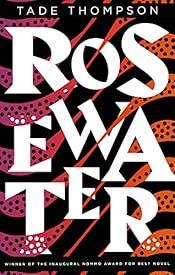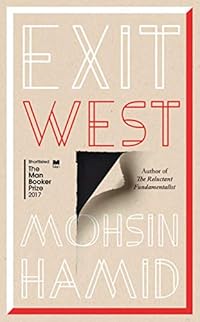Rosewater by Tade Thompson
Posted in Fantasy, Reading Reviewed, Science Fiction at 12:00 on 22 February 2020
Orbit, 2018, 393 p.

Rosewater was a nominee for the BSFA Award last year and won the Clarke Award. Its successor The Rosewater Insurrection is on this year’s BSFA Award short list. As I hope to get round to reading that before voting I thought I’d better look at this first.
Rosewater is a doughnut-shaped city that surrounds the biodome, an alien outcropping in Nigeria. The biodome opens once every year for twenty or thirty minutes and everyone in the vicinity is cured of all physical ailments. Even dead people can be reanimated, but the results tend to be soulless and mindless, and have to be killed again.
Narrator Kaaro is a sensitive, able to discern the thoughts of others by accessing the xenosphere, strands of alien fungi-like filaments and neurotransmitters, which link with the natural fungi on human skin and penetrate the nervous system. His abilities have made him useful to S45, a branch of the Nigerian security services. He is also a finder, and a thief. Later his abilities are referred to as those of a quantum extrapolator. His attitudes are misogynist and sexist, notwithstanding his entering a relationship with a woman called Aminat. Not that strong women are missing in the book, his initial S45 boss, Femi Alaagomeji, and Aminat being cases in point.
The novel is structured into scenes taking place in Kaaro’s Now of 2066, the Then of when the biodome first appeared and its subsequent evolution, and interludes describing his previous missions for S45. This tends to render the reading experience as bitty. Just when getting into the swing of things in one timeline we are jarred out of it, often with a cliffhanger. Coming across in the background we find that the thing humans call Wormwood was an amœbic blob of alien organic matter that fell to Earth in 2012 in Hyde Park, London. Unlike previous such incursions, Wormwood survived and (apparently) tunnelled its way to Nigeria.
Not that it has any real connection to any part of Kaaro’s story, but we are informed that in this world, as a response to the alien incursions, the US has withdrawn into itself, letting nothing in or out, not even information.
At the start of the book Kaaro has a job protecting a bank’s customers from the attentions of other sensitives out to steal their information. This is one of the hares Thompson sets running but never quite catches. There is the biodome itself, the appearance of a character known as Bicycle Girl or Oyin Da, and, in an apparent signal to a thriller subplot that never arrives, sensitives are dying. In the wider xenosphere, where reality is very distorted, Kaaro uses a gryphon as an avatar. Aminat’s brother, Layi, is kept chained in her flat to prevent him burning things using his own xenospheric power.
As can perhaps be gleaned from the previous paragraph there is too much going on in the novel which, as a result, fails to achieve focus. Thompson can undoubtedly write but hasn’t yet found the virtue of economy. Quite why Rosewater has been accorded the accolades it has is therefore a bit obscure.
Pedant’s corner:- “crimes perpetuated in the xenosphere” (crimes perpetrated,) “Ascomytes xenophericus” (elsewhere Ascomytes xenosphericus,) smoothes (smooths,) “amuses me to no end” (‘to no end’ means ‘without purpose’, ‘amuses me no end’ [‘no end’ = infinitely] was meant,) aircrafts “OK it was in dialogue but the plural of aircraft is aircraft.) “None of the people around me are harmed” (None …is harmed.) “None of them want to live in the refugee camps” (None of them wants to live….)


